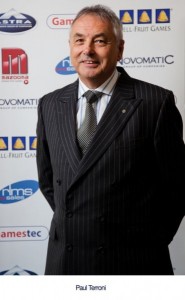Despite a mixed reception to the news, Astra Group’s Paul Terroni has claimed Bell-Fruit’s decision to change its business model and introduce dongle technology to its UK Category C games is aimed at “securing the future of the sector.”


From October, the company’s newly launched Category C models will feature the technology. This will see the game software enabled via a resin-encapsulated piece of hardware – the dongle – within which a finite expiry date is set. The dongle plugs into a receptacle device inside the machine, which is connected to the main MPU. The dongle expiry will occur on the first anniversary of the launch date of the model in question, at which point a reloaded dongle can be purchased.
“The business model the industry has been working to is simply incapable of sustaining a healthy market in which manufacturers are able to commit to the levels of on-going investment, which are necessary in order to deliver top performing AWPs,” Terroni told InterGame. “In many cases, AWPs occupy the most profitable 4sq.ft of a pub interior. This doesn’t happen by accident, it’s the outcome of investing in brand licences, investing in the best quality software engineers, investing in machine security and so on.
“To justify this investment the business model has to be sound.”
There has been a significant reduction in sales of Category C games in recent years, from a high of 60,000 in 2002 to 13,500 in 2011. Costs, said Terroni, have increased and have placed greater pressure on manufacturers.
Introducing dongle technology will help to re-shape the business model for everyone, he said.
“There’s never a good time to introduce what some quarters were always going to perceive as simply a price rise. Myself and the Bell-Fruit team continue to spend a lot of our time explaining the strategy to customers and providing them with the arguments and support they need to take to their customers.
“I fully appreciate and understand some of the more emotional responses but ultimately this is about securing the future of the sector, which has already lost notable manufacturing brands because the business model was so outdated and imbalanced.
“Our aim is to preserve employment prospects at Bell-Fruit but also in the supply chain, which includes component and peripheral device suppliers, transport companies, operators and any others spread throughout the country.”
This can only be achieved, he added, if the market is structured in a “sustainable way.”

